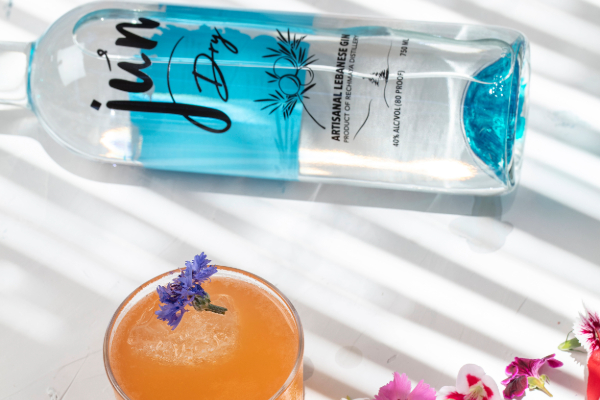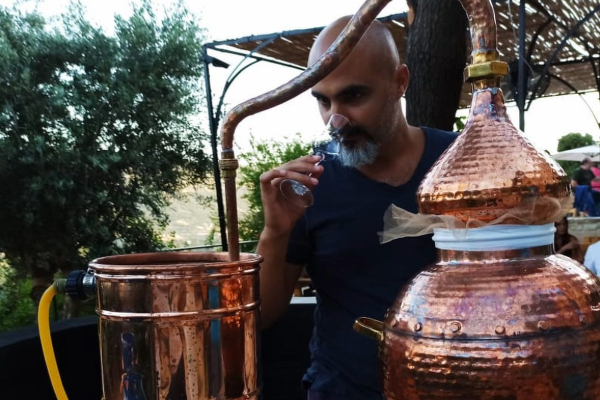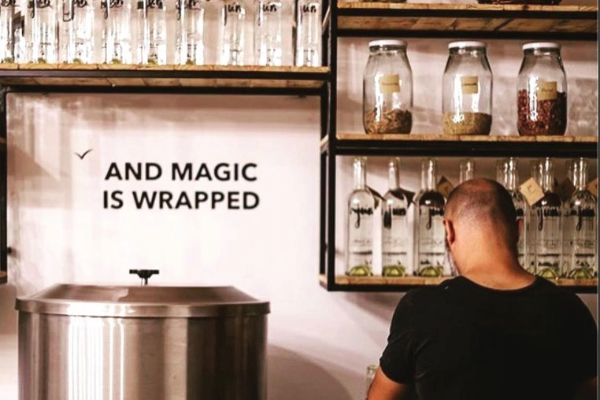
22/10/2024 Chadi Naccour, the co-owner and master distiller of Rechmaya Distillery, gives his unique perspective to the world of spirits
Chadi Naccour’s passion for flavors, cooking, experimenting with aromas and love for alcohol steered him in the direction of taking up a career in distilling. Chadi Naccour shares with Bartender Spirits Awards how his culinary expertise and love for his hometown inspired him to create Rechmaya Distillery’s JUN Gins, distinctive spirits that celebrate Lebanese flavors and traditions.
[[relatedPurchasesItems-31]]
Tell us a little about your background and journey into distilling
Before I got into distilling, I worked as a graphic designer for quite a while in Australia and then in Dubai for some years. During those years, I even pursued my passion for cooking and got a master’s degree from a culinary school. After working in the design field for more than a decade, my partner and I decided that it was time to return to Lebanon and start our very own business. We had always discussed that we should open a gin distillery in our hometown of Rechamaya. In order to make that dream a reality and to better prepare myself for the role, I traveled to South Africa to take a course in which I learned about distilling, fermentation and flavors. With all the knowledge gained, we tried and tested various recipes before finally perfecting our current JUN Gin recipe at the Rechmaya Distillery.
Also read: Must-Try Gins for Bartenders According to the Bartenders Spirits Awards 2024

Image Title and Credits: Rechmaya Distillery's JUN Dry Gin
Your current role and what does your day look like?
Currently, I am the master distiller at Rechmaya Distillery, so I take care of the production process—everything from choosing the ingredients to making the gin. Typically, I start my day by walking around my garden, where I look for some inspiration for the next recipe. I particularly check to see if there are any botanicals that are in season that could be added to the gin. When I discover something that would be perfect to infuse in the gin, I handpick the ingredient but that is only when necessary. We mostly source all our ingredients locally. I spend the rest of the day fulfilling previous orders by distilling, infusing, or bottling the drinks based on the requests received. Through all this, my partner manages all the sales and communication.
How do you think a distiller can help in driving marketing and sales personally?
As a distiller, it’s important to stay on top of market trends so I can spot new opportunities for growth. I work closely with my marketing team to come up with seasonal products and run different promotional campaigns. I also like to engage directly with customers during tasting sessions, which gives me valuable feedback to fine-tune our offerings. And of course, I make sure to participate in exhibitions since it’s a great way to network and promote my products.

Image Title and Credits: Chadi Naccour of Rechmaya Distillery
What is the hardest part of a distiller's job?
For a distiller to truly stand out, they should have certain skills, such as creativity, consistency, technical expertise, and scientific knowledge. However, it can become super challenging to find that perfect balance between creativity and consistency. This is because while you should always keep experimenting with new flavors and recipes, you shouldn’t get too preoccupied with them, thus sacrificing the taste of the gins that already exist. You need to ensure that each batch is of top quality and steady consistency. That itself can be tricky, as you need to focus on factors like temperature and even the slightest change in ingredients can totally impact the outcome, so you’ve got to be super detail-oriented. Additionally, I feel that it can be a constant struggle to keep up with market trends while also staying true to your brand’s identity.
Also read: Top 10 Best Gins for the Trending Ramos Gin Fizz
What are the current challenges the spirits industry is facing, according to you?
One of the most challenging situations that is prevalent in the distilling industry, especially for artisanal distillers, is the rising costs of raw materials and packaging. The inflation and the supply chain disruption have surely impacted everyone in the industry negatively. However, it is small distilleries like ours that face the consequences the most. Through all these difficulties, it can get tricky to stay consistent in terms of quality, production, and pricing, all while trying to keep our costs steady.

Image Title and Credits: Gin Distiller Chadi Naccour
What steps do you take to become more sustainable?
Since starting the Rechmaya distillery, we have always been focused on minimizing our carbon footprint in everything we do. For starters, we’ve installed solar panels to power our distillery, which allows us to reduce our reliance on traditional energy sources while we work. We also recycle the water from our condenser during the distillation process to avoid unnecessary waste. Another way we stay sustainable is by reusing the spent botanicals from our gin infusions as compost to enrich the soil in our garden. For us, it’s all about being mindful of our environmental impact and finding ways to make our operations more eco-friendly.
Header image by Chadi Naccour
Related links
How Are Distilleries Tackling Their Waste Problem?
Artisanal Spirits Importers in the USA: A Gateway to Craftsmanship and Authenticity



